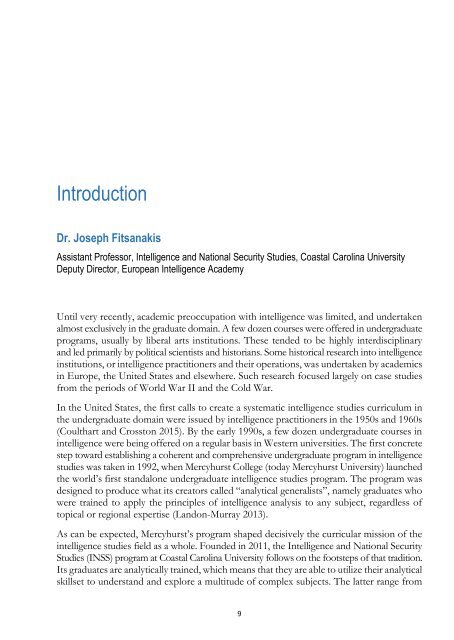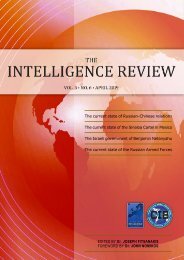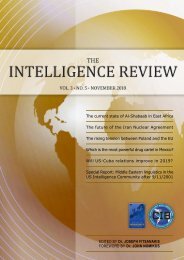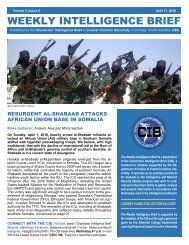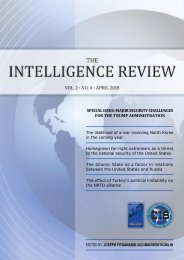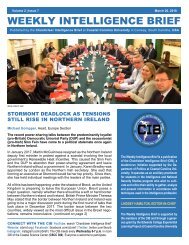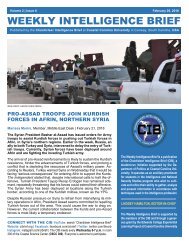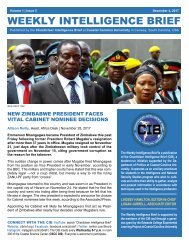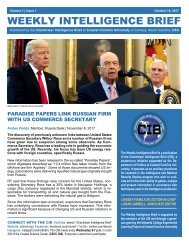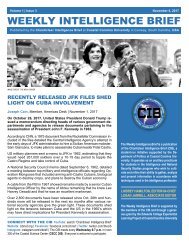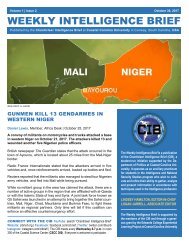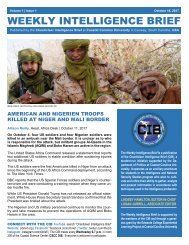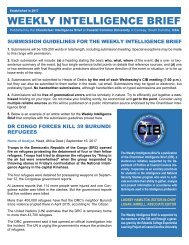The Intelligence Review | volume 1 | issue 2 |
This volume is the product of a collaboration between the European Intelligence Academy (EIA) and the Chanticleer Intelligence Brief (CIB), a student-run initiative supported by the Department of Politics at Coastal Carolina University in Conway, South Carolina, United States. Eleven CIB analysts tackle some of the most pressing and timely questions confronting intelligence observers today. Topics include the gun control debate in the United States, Russia’s involvement in the Syrian Civil War, the future of Kurdish nationalism, and the internal Palestinian dispute between Hamas and Fatah. Papers in this volume also examine the current state of Islamist extremism, and extrapolate on its future prospects in the Middle East, West Africa, the Lake Chad region, as well as in Southeast and Central Asia. CIB analysts propose carefully crafted and informed forecasts that outline future developments in some of the world's most unpredictable hot spots.
This volume is the product of a collaboration between the European Intelligence Academy (EIA) and the Chanticleer Intelligence Brief (CIB), a student-run initiative supported by the Department of Politics at Coastal Carolina University in Conway, South Carolina, United States. Eleven CIB analysts tackle some of the most pressing and timely questions confronting intelligence observers today. Topics include the gun control debate in the United States, Russia’s involvement in the Syrian Civil War, the future of Kurdish nationalism, and the internal Palestinian dispute between Hamas and Fatah. Papers in this volume also examine the current state of Islamist extremism, and extrapolate on its future prospects in the Middle East, West Africa, the Lake Chad region, as well as in Southeast and Central Asia. CIB analysts propose carefully crafted and informed forecasts that outline future developments in some of the world's most unpredictable hot spots.
- No tags were found...
Create successful ePaper yourself
Turn your PDF publications into a flip-book with our unique Google optimized e-Paper software.
Introduction<br />
Dr. Joseph Fitsanakis<br />
Assistant Professor, <strong>Intelligence</strong> and National Security Studies, Coastal Carolina University<br />
Deputy Director, European <strong>Intelligence</strong> Academy<br />
Until very recently, academic preoccupation with intelligence was limited, and undertaken<br />
almost exclusively in the graduate domain. A few dozen courses were offered in undergraduate<br />
programs, usually by liberal arts institutions. <strong>The</strong>se tended to be highly interdisciplinary<br />
and led primarily by political scientists and historians. Some historical research into intelligence<br />
institutions, or intelligence practitioners and their operations, was undertaken by academics<br />
in Europe, the United States and elsewhere. Such research focused largely on case studies<br />
from the periods of World War II and the Cold War.<br />
In the United States, the first calls to create a systematic intelligence studies curriculum in<br />
the undergraduate domain were <strong>issue</strong>d by intelligence practitioners in the 1950s and 1960s<br />
(Coulthart and Crosston 2015). By the early 1990s, a few dozen undergraduate courses in<br />
intelligence were being offered on a regular basis in Western universities. <strong>The</strong> first concrete<br />
step toward establishing a coherent and comprehensive undergraduate program in intelligence<br />
studies was taken in 1992, when Mercyhurst College (today Mercyhurst University) launched<br />
the world’s first standalone undergraduate intelligence studies program. <strong>The</strong> program was<br />
designed to produce what its creators called “analytical generalists”, namely graduates who<br />
were trained to apply the principles of intelligence analysis to any subject, regardless of<br />
topical or regional expertise (Landon-Murray 2013).<br />
As can be expected, Mercyhurst’s program shaped decisively the curricular mission of the<br />
intelligence studies field as a whole. Founded in 2011, the <strong>Intelligence</strong> and National Security<br />
Studies (INSS) program at Coastal Carolina University follows on the footsteps of that tradition.<br />
Its graduates are analytically trained, which means that they are able to utilize their analytical<br />
skillset to understand and explore a multitude of complex subjects. <strong>The</strong> latter range from<br />
9


